Diplomatic Bluebook 2024
Chapter 2
Resilient and Unwavering Regional Diplomacy
3 LAC Countries
(1) Mexico
President Andrés Manuel López Obrador, who was inaugurated in December 2018, has promoted policies emphasizing domestic affairs such as combating corruption, correcting disparities, and improving security, while continuing free trade since his administration took office. In 2023, the fifth year of his administration, he continued to maintain a high approval rating.
In regard to relations with Japan, the 135th anniversary of the establishment of Japan-Mexico diplomatic relations was marked by active exchanges in the political and economic fields. In January, Foreign Minister Hayashi visited Mexico on his first overseas trip in 2023, during which he held a foreign ministers' meeting with Secretary of Foreign Affairs Marcelo Ebrard and met with Secretary of Economy Raquel Buenrostro. In August, Foreign Minister Hayashi held a telephone call with Secretary of Foreign Affairs Alicia Bárcena immediately after her appointment to the position. In September, Foreign Minister Kamikawa and Foreign Secretary Bárcena held a foreign minister's meeting during the High-Level Week of the 78th Session of the UNGA, in which they concurred that they would cooperate between the female foreign ministers not only to further strengthen bilateral relations, but also to address global issues and regional situations in various areas. The two Ministers also confirmed the importance of maintaining the high standards of the CPTPP, concurred on continued close cooperation, and discussed improving the business environment in Mexico.
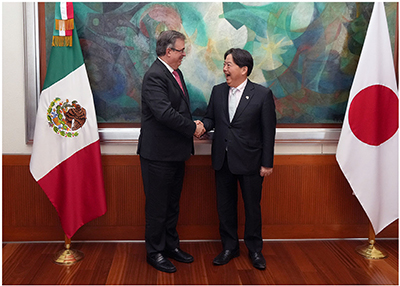 Japan-Mexico Foreign Ministers' Meeting (January 5, Mexico City, Mexico)
Japan-Mexico Foreign Ministers' Meeting (January 5, Mexico City, Mexico)In regard to economic relations, approximately 1,300 bases of Japanese companies, the largest number in the LAC region, have established operations in Mexico. In June, the 13th meeting of the Committee for the Improvement of the Business Environment, which was established under the Japan-Mexico Economic Partnership Agreement, was held in Mexico City, with Parliamentary Vice-Minister for Foreign Affairs AKIMOTO Masatoshi serving as co-chair from the Japanese side. The meeting was attended by representatives from the public and private sectors of both Japan and Mexico, and the participants discussed and exchanged views on issues and concerns related to the business environment.
In regard to relations with third countries, Mexico continued to place emphasis on relations with the United States (U.S.), holding frequent discussions not only on economic relations but also on issues such as immigration and narcotics. The U.S.-Mexico High-Level Economic Dialogue and the U.S.-Mexico High-Level Security Dialogue were respectively held in September and October with the attendance of ministers of both countries, and dialogue and initiatives have continued based on the U.S.-Mexico-Canada Agreement (USMCA). In November, at the request of President Joseph Biden of the U.S., President López Obrador attended the APEC Leaders' Meeting (San Francisco, U.S.) for the first time since his inauguration, and held summit meetings with the U.S., Canada, and China.
In October, President Obrador held the “Meeting for a Fraternal Neighborhood with Wellbeing” in Palenque, in the southern state of Chiapas to explore structural causes and comprehensive solutions to the migration phenomenon in the LAC region, which was attended by leaders and ministers from the region.
(2) Central America (El Salvador, Guatemala, Costa Rica, Dominican Republic, Nicaragua, Panama, Belize, and Honduras)
The Alliance for Development in Democracy (ADD), established in 2021 by Costa Rica, Panama, and the Dominican Republic (with Ecuador joining in 2022), positions itself as a group that shares universal values and principles, including democracy, human rights, and the rule of law. In cooperation with the U.S., it aims for development through a highly transparent process that respects human rights in the region, and promotion of cooperation, trade, and investment. In 2023, the ADD expressed concern about the situation in Haiti and the situation in Guatemala after the presidential election run-off in August. As for the Guatemalan presidential election, candidate Bernardo Arévalo was elected as the new president as a result of the run-off.
Regarding relations with Japan, in January, Deputy Secretary of Foreign Affairs and International Cooperation Gerardo Torres Zelaya of Honduras visited Japan and held wide-ranging exchanges of views with government officials and others. In February, during the UNGA Emergency Special Session on Ukraine, there was a Japan-Guatemala Foreign Ministers' Meeting in which the ministers exchanged wide-ranging views on bilateral relations and cooperation in the international arena, and Guatemala concurred to closely cooperate with Japan in promoting FOIP. In April, Vice President Raquel Peña Rodríguez of the Dominican Republic, who was making a working visit to Japan, paid a courtesy call to Prime Minister Kishida. She welcomed Japan's initiative on FOIP, and exchanged views on regional situations in East Asia, Ukraine, Haiti, and elsewhere. In May, Vice-Minister of Foreign Affairs Vladimir Adolfo Franco Sousa of Panama paid a visit to Japan in which he exchanged views with government officials and visited regional cities to strengthen relations in the maritime field.
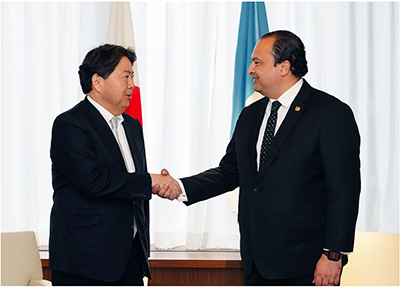 Japan-Guatemala Foreign Ministers' Meeting (February 23, New York, U.S.)
Japan-Guatemala Foreign Ministers' Meeting (February 23, New York, U.S.)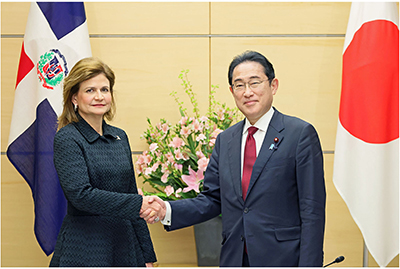 Courtesy call on Prime Minister Kishida by Vice President Peña of the Dominican Republic (April 4, Tokyo; Photo: Cabinet Public Affairs Office)
Courtesy call on Prime Minister Kishida by Vice President Peña of the Dominican Republic (April 4, Tokyo; Photo: Cabinet Public Affairs Office)(3) Cuba
President Miguel Díaz-Canel was reelected (five-year term, up to two consecutive terms) by the National Assembly of People's Power, which convened in April. Immediately after his inauguration, President Díaz-Canel appointed the prime minister, cabinet members, and other officials, with Prime Minister Manuel Marrero Cruz retaining his position. On the diplomatic front, the Summit of Heads of State and Government of the Group of 77 and China was held in Cuba's capital city Havana in September, and the Havana Declaration was adopted with “Current Development Challenges” as its main theme. The deteriorating situation of Cuba's economy is becoming even more severe due to COVID-19, international affairs, and other factors, and the lives of the people have become even more difficult.
In regard to relations with Japan, Deputy Minister of Foreign Affairs Josefina de la Caridad Vidal Ferreiro visited Japan in October, exchanged views on a wide range of fields with government officials and others, and held a Japan-Cuba Policy Dialogue.
(4) Brazil
The administration of President Luiz Inácio Lula da Silva, which was inaugurated in January, is working to address global issues while raising initiatives for addressing environmental problems, including the deforestation of the Amazon as important political issues. In terms of economic policy, the administration is deliberating on tax reform and focusing on the promotion of “neo-industrialization” including the digital and green sectors.
In regard to relations with Japan, in January, Ambassador on Special Mission OBUCHI Yuko (a member of the House of Representatives) attended the inauguration ceremony of President Lula and held meetings with government officials and people related to the National Congress. Foreign Minister Hayashi also visited Brazil and met with Foreign Minister Mauro Luiz Iecker Vieira. In May, Prime Minister Kishida met with President Lula, who attended the G7 Hiroshima Summit because Brazil was an invited country, and the two leaders concurred on cooperating toward the G20 Summit in 2024, which Brazil will chair. In September, Foreign Minister Kamikawa held a meeting with Foreign Minister Vieira during the UNGA High-Level Week. In addition, from September 30, visa exemption for holders of ordinary Brazilian passport visiting Japan for the purpose of “Short-Term Stay” activities began, thereby realizing mutual short-stay visa exemption between the two countries.
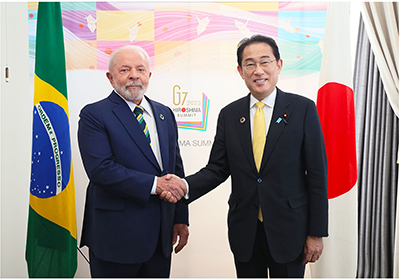 Japan-Brazil Summit Meeting (May 20, Hiroshima Prefecture; Photo: Cabinet Public Affairs Office)
Japan-Brazil Summit Meeting (May 20, Hiroshima Prefecture; Photo: Cabinet Public Affairs Office)Moreover, public and private sector dialogue toward strengthening economic relations between the two countries is being invigorated, including a meeting of the Wise Group for Strategic Economic Partnership between Japan and Brazil held in April, and a meeting of the Japan-Brazil Business Council held in July.
(5) Argentina
The Alberto Fernández administration continued to face domestic problems in terms of foreign currency revenues and investment, due to causes including the fact that the historic drought caused a significant decline in agricultural production, a major export commodity. Argentina also recorded the worst inflation rate in the past 30 years and failed to realize economic growth that its citizens can actually feel in their lives. In the midst of the economic crisis, a presidential election was held. The opposition party candidate, Javier Milei, who criticized the established political parties and advocated for a “small government” with austerity measures and privatization of state-owned enterprises, won the election and was inaugurated in December.
In regard to relations with Japan, 2023 marked the 125th anniversary of the establishment of Japan-Argentina diplomatic relations, and the Foreign Ministers of both countries made reciprocal visits. In January, Foreign Minister Hayashi visited Argentina, paid a courtesy call to President Fernandez, and met with Minister of Foreign Affairs, International Trade and Worship Santiago Andrés Cafiero and Minister of Economy Sergio Tomás Massa. In August, Minister of Foreign Affairs, International Trade and Worship Cafiero visited Japan, paid a courtesy call to Prime Minister Kishida, and held meetings with Foreign Minister Hayashi; Minister of Economy, Trade and Industry NISHIMURA Yasutoshi; and Minister of Education, Culture, Sports, Science and Technology NAGAOKA Keiko. In December, Ambassador on Special Mission SANTO Akiko (a member of the House of Councillors) attended the inauguration of President Milei and paid a courtesy call to President Milei. Through various opportunities, Japan and Argentina confirmed the importance of strengthening bilateral relations and cooperation in the international arena through the Nikkei community and other bonds as important “strategic partners” that share fundamental values and principles.
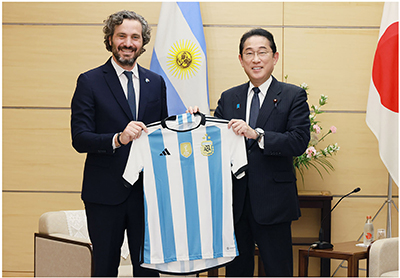 Courtesy call on Prime Minister Kishida by Minister of Foreign Affairs, International Trade and Worship Cafiero of Argentina (August 29, Tokyo; Photo: Cabinet Public Affairs Office)
Courtesy call on Prime Minister Kishida by Minister of Foreign Affairs, International Trade and Worship Cafiero of Argentina (August 29, Tokyo; Photo: Cabinet Public Affairs Office)(6) Peru
President Pedro Castillo was removed from office in December 2022, and Vice President Dina Boluarte assumed the presidency. In January 2023, protests were held in the country demanding that the presidential election be moved forward. President Boluarte herself submitted a constitutional amendment to push forward the election to the Congress, but the Congress rejected it. Public attention was focused on the damage caused by Hurricane Yaku and other issues, and since then, demands to move the election forward have waned.
In regard to relations with Japan, the 150th anniversary of the establishment of diplomatic relations between Japan and Peru was marked with reciprocal visits by the Foreign Ministers of both countries (See the Column on this page). In May, Foreign Minister Hayashi visited Peru, paid a courtesy call to President Boluarte, and held a meeting with Foreign Minister Ana Cecilia Gervasi Diaz. From August to September, Foreign Minister Gervasi visited Japan and met with Foreign Minister Hayashi. During the APEC Ministerial Meeting held in the U.S. in November, Foreign Minister Kamikawa and Foreign Minister Javier González-Olaechea Franco held the third Japan-Peru Foreign Ministers' Meeting in 2023. In addition, at the Summit Video Teleconference Meeting between Prime Minister Kishida and President Boluarte, which was held in August to commemorate the 150th anniversary of the establishment of Japan-Peru diplomatic relations, the leaders concurred and confirmed that a roadmap for bilateral cooperation in various fields would be formulated for 2024.
In 2023, Japan and Peru celebrated the 150th anniversary of the establishment of diplomatic relations. Japan has had diplomatic relations with Peru longer than any other Latin American and Caribbean (LAC) countries. Diplomatic relations between Japan and Peru were also the first such relations to ever be established between Asian and LAC countries. This column introduces the history of friendly relations between the two countries, as well as the various initiatives undertaken to commemorate the 150th anniversary.
●A History of Close Friendly Relations
Diplomatic relations between Japan and Peru began with the signing of the Treaty of Friendship, Commerce, and Navigation on August 21, 1873, and have developed favorably through today. The foundation for the bilateral relations is the Nikkei community in Peru, which has the longest history in South America and has grown to 200,000 people, the third largest in the world now. Since the arrival of the immigrant ship “Sakura Maru” with 790 Japanese immigrants in the port of Callao on April 3, 1899, Japanese immigrants have contributed to the growth and development of Peru as members of Peruvian society, while inheriting and passing on Japanese culture and traditions. In addition, the Peruvian Nikkei community has not only served as a bridge between the two countries, but many Nikkei Peruvians are also active in Japan, the U.S., the LAC region, and European countries.
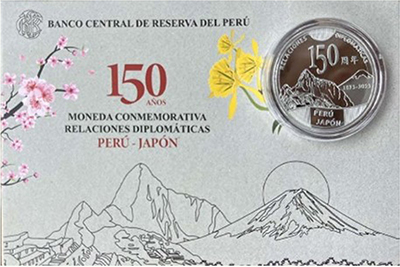 Coin depicting Machu Picchu and Mount Fuji that commemorate the 150th anniversary of the establishment of diplomatic relations between Japan and Peru
Coin depicting Machu Picchu and Mount Fuji that commemorate the 150th anniversary of the establishment of diplomatic relations between Japan and Peru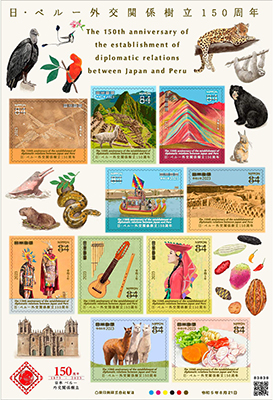 commemorative stamps issued by Japan Post
commemorative stamps issued by Japan Post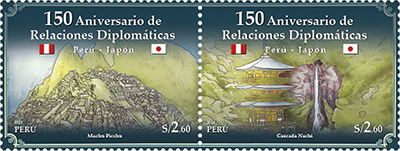 Servicios Postales del Perú
Servicios Postales del PerúJapan and Peru are “strategic partners” that share fundamental values and principles. The two countries cooperate in the international arena through the United Nations (UN), the Asia-Pacific Economic Cooperation (APEC), and other means. On the economic front, they have built close relations including through the bilateral economic partnership agreement, tax convention, and the Comprehensive and Progressive Agreement on Trans-Pacific Partnership (CPTPP). Peru has received the most Official Development Assistance (ODA) from Japan in the LAC region through 2021, and in recent years, Japanese companies have participated in infrastructure projects in Peru through government-to-government (G2G) contracts. On the cultural front, a large number of Japanese universities are contributing to Peruvian archaeology, and exchanges between the two countries are becoming more diverse, such as conferences for university presidents.
●Commemorating the 150th Anniversary of the Establishment of Diplomatic Relations
In order to commemorate the 150th anniversary of the establishment of diplomatic relations in 2023, Japan and Peru implemented exchanges and projects in various fields including politics and diplomacy, economy, and culture.
On the diplomatic front, Foreign Minister Hayashi visited Peru in May, Foreign Minister Gervasi Diaz visited Japan in September, and the third Japan-Peru Foreign Ministers' Meeting in 2023 was held during the APEC Ministerial Meeting in the U.S. in November. In addition, at the Japan-Peru Summit Video Teleconference Meeting held in August, the leaders shared the view and confirmed that a road map for future cooperation in various fields would be drawn up by 2024. On the cultural front, the Japan Foundation's first office in Spanish-speaking countries in South America was newly established in Lima, the capital of Peru, and the Peruvian Japanese Association (APJ) received a Japan Foundation Award for its contributions to Japanese language education. In November, Her Imperial Highness Princess Kako of Akishino visited Peru, where she received an enthusiastic welcome from the Peruvian people. She paid a courtesy call to President Dina Boluarte, participated in a ceremony to welcome the Princess and commemorated the 150th anniversary of the establishment of diplomatic relations, and attended another ceremony hosted by the APJ commemorating the 150th of the establishment of diplomatic relations.
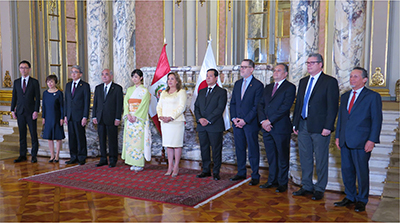 President Boluarte and Her Imperial Highness Princess Kako of Akishino (November 7, Lima, Peru; Photo: Imperial Household Agency)
President Boluarte and Her Imperial Highness Princess Kako of Akishino (November 7, Lima, Peru; Photo: Imperial Household Agency)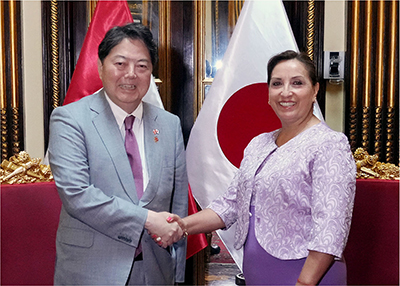 Foreign Minister Hayashi pays a courtesy call to Peruvian President Boluarte (May 3, Lima, Peru)
Foreign Minister Hayashi pays a courtesy call to Peruvian President Boluarte (May 3, Lima, Peru)Japan and Peru will mark the 125th anniversary of the Japanese immigration to Peru in 2024, and plan to continue close exchanges. Although Japan and Peru are located on opposite sides of the globe, the two countries have connections in diverse fields such as politics, economy, culture, and academia, and it is expected that they will continue to develop friendly relations for a long time to come.
(7) Chile
The administration of President Gabriel Boric, which was inaugurated in March 2022, aims to reduce disparities and improve welfare, and is touting promotion of reform of social security policies, including pensions and the tax system. However, the ruling leftist party, which supports the administration, is in the minority in both the upper and lower houses of the National Congress, making it difficult for the administration to implement its various policies. On the foreign policy front, the administration has set forth its approach of placing importance on human rights, gender, the environment, and multilateralism.
In regard to the new constitution-drafting process, following the rejection of the proposed new constitution in a referendum in September 2022, the Constitutional Council consisting of 50 members newly appointed through elections was formed in June 2023, and a new draft constitution was prepared on the initiative of this Council. However, in a referendum held in December of the same year, the new draft constitution was again rejected, and President Boric announced the end of the new constitution-drafting process during his term.
In addition, the CPTPP entered into force in Chile in February 2023, making Chile the 10th signatory state.
In regard to relations with Japan, the Government of Japan provided emergency relief supplies at the request of the Government of Chile in response to a major forest fire that broke out in the central and southern regions of Chile at the end of January. In May, Foreign Minister Hayashi visited Chile, paid a courtesy call to President Boric and held a meeting with Foreign Minister Alberto Leo van Klaveren Stork, during which the two ministers signed the Japan-Chile Agreement on Cooperation in Science, Technology and Innovation. During the APEC Ministerial Meeting in November, Foreign Minister Kamikawa met with Foreign Minister van Klaveren, and the two ministers concurred on deepening bilateral cooperation in fields such as critical mineral resources and clean energy and confirmed bilateral collaboration in maintaining the high standards of the CPTPP. They also exchanged views on the international situation and confirmed cooperation in the international arena as “strategic partners” that share values and principles.
(8) Uruguay
The Luis Lacalle Pou administration, which was inaugurated in March 2020, has maintained a high approval rating with its stable management since its inauguration to the second half of the current term (as of the end of 2023). Uruguay ranked first in the LAC region in the Democracy Index.4 In economic policy, the administration adheres to free trade principles and places importance on market expansion and liberalization. In terms of foreign policy, it has developed diplomacy based on the values of democracy, the rule of law, and the protection of human rights.
In regard to relations with Japan, since President Lacalle Pou's visit to Japan in 2022, exchanges have been conducted in a variety of fields. The working holiday program began operation in March 2023. On the diplomatic front, State Minister for Foreign Affairs Takei visited Uruguay in August and paid a courtesy call to Vice President Beatriz Argimón Cedeira. In addition, in October, one year after President Lacalle Pou's visit to Japan, the first session of the Japan-Uruguay Joint Committee on cross-sectoral cooperation, which was agreed to be established at the summit meeting during President Lacalle Pou's visit, and the first Japan-Uruguay Policy Consultation in five years were held.
- 4 Source: Economist Intelligence Unit's Democracy Index 2022
(9) Paraguay
Presidential elections were held in Paraguay in April, and Santiago Peña Palacios, the candidate from the ruling Colorado Party, won the election and assumed the presidency in August. Following the previous administration, he has defended fundamental values and principles such as the rule of law and respect for human rights and has focused on job creation.
In regard to relations with Japan, Foreign Minister Hayashi visited Paraguay in May, marking the second visit by a Japanese foreign minister to the country. Foreign Minister Hayashi held a meeting with Foreign Minister Julio César Arriola Ramírez and paid a courtesy call to President-elect Peña shortly after his election as president. In August, State Minister for Foreign Affairs Takei attended the presidential inauguration ceremony as an Ambassador on Special Mission and paid courtesy calls to President Mario Abdo Benitez and President Peña. Furthermore, at the end of August, Foreign Minister Hayashi and Foreign Minister Rubén Darío Ramírez Lezcano, who had just assumed his position, held a telephone call. Through the series of dignitaries' visits and meetings, opinions were exchanged on common bilateral issues and the international situation, and bilateral relations between Japan and Paraguay became closer.
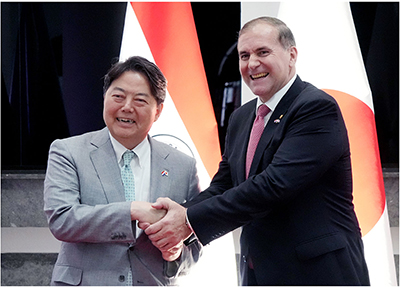 Japan-Paraguay Foreign Ministers' Meeting (May 5, Asuncion, Paraguay)
Japan-Paraguay Foreign Ministers' Meeting (May 5, Asuncion, Paraguay)(10) Colombia
The Gustavo Francisco Petro Urrego administration, which was inaugurated in August 2022, is advancing deliberations on major social reform bills, including health insurance system reform, pension reform, and labor reform. However, no significant progress has been seen due to conflicts within the ruling coalition. Meanwhile, President Petro has made it his greatest mission to achieve “total peace” with the armed forces in the country, and he has been promoting peace negotiations with the armed forces, including the National Liberation Army (ELN).5 President Petro has also positioned climate change countermeasures as an urgent issue and is promoting decarbonization.
In regard to relations with Japan, Parliamentary Vice-Minister for Foreign Affairs Akimoto visited Colombia in June, held meetings with key government figures, and exchanged views with members of Japanese companies. In addition, Parliamentary Vice-Minister of Economy, Trade and Industry SATOMI Ryuji visited Colombia in July, signed a memorandum of cooperation on the establishment of a Joint Committee between Japan and Colombia on Cooperation in Trade, Investment, and Industry, and confirmed that the two countries will advance bilateral trade and investment promotion.
- 5 ELN: Ejército de Liberación Nacional, National Liberation Army
(11) Venezuela
The inauguration ceremony for President Nicolás Maduro was held in 2019 amidst doubts about the legitimacy of the presidential election held in 2018. In 2020, the election for Venezuela's National Assembly was held without the participation of the main opposition parties, and the Maduro administration's party was declared the winner. In response, people in Venezuela, including the main opposition party, as well as the international community reacted against the election, claiming that it lacked legitimacy. Similarly, Japan has been calling for the restoration of democracy in Venezuela through the early implementation of a free and fair election.
In October 2023, a dialogue between the parties in Venezuela was held and a political agreement was signed for the implementation of free and fair elections, including, but not limited to, the 2024 presidential election. Based on the agreement, it was decided to hold the presidential election in the second half of 2024 and to accept international electoral observation missions. In the same month, the primary election was held among opposition parties for the presidential election, and María Corina Machado, leader of the Vente Venezuela party, won by a wide margin over the second-place finisher.
Due to the worsening economic, social, and humanitarian situation in the country, Venezuelan nationals are continuing to flow into neighboring countries as refugees and migrants, and receiving them has become a regional challenge. Japan is continuing to provide support to the Venezuelan people, including people fleeing from Venezuela, as well as to affected neighboring countries.
(12) Bolivia
Bolivia's economic structure depends on exports of natural gas and other natural resources. However, the country's budget deficit is ballooning and foreign currency shortages are becoming more serious due to a sharp decline in natural gas reserves. On the other hand, Bolivia's estimated lithium resources are the largest in the world. Bolivia is increasing its activities for lithium exploration and mining, including the Government of Bolivia signing an agreement with Chinese and Russian companies for large-scale lithium production in June.
In regard to relations with Japan, Parliamentary Vice-Minister for Foreign Affairs Akimoto visited Bolivia in June, paid courtesy calls on and held meetings with Vice President David Choquehuanca Céspedes, Foreign Minister Rogelio Mayta, and other government officials, and confirmed that efforts would be made to further strengthen bilateral relations. In June, Japan signed the Customs Mutual Assistance Agreement with the Government of Bolivia, which entered into force. In October, the sixth Japan-Bolivia Policy Consultations was held.
(13) Ecuador
In May, President Guillermo Lasso dissolved the National Assembly and decided to move forward the presidential election. After the first round of voting in August, a runoff election was held in October. Candidate Daniel Noboa won the election and was inaugurated in November as the youngest president in Ecuador's history. The challenge for President Noboa is whether he can achieve results in the areas of security, job creation, attracting domestic and foreign investment, and improving education and healthcare systems during his short term of office, which ends in May 2025.
In regard to relations with Japan, Ecuador is serving as a non-permanent member of the UNSC along with Japan for two years beginning in January 2023. The two countries are cooperating to address the current difficult international situation and to strengthen UN functions, including UNSC reform. In January, Foreign Minister Hayashi visited Ecuador and held a foreign ministers' meeting, during which Minister of Foreign Affairs and Human Mobility Juan Carlos Holguin expressed support for Japan's FOIP efforts to maintain and strengthen the free and open international order based on the rule of law. Further cooperation between Japan and Ecuador is underway, including the two countries signing an Exchange of Notes in November at Foreign Minister Holguin's request on the provision of fisheries control vessels as a measure against illegal, unreported, and unregulated (IUU) fishing.
(14) Collaboration with the Nikkei Community
The Nikkei community has been the foundation for the sense of affinity toward Japan in LAC countries. Nevertheless, generations have transitioned over 100 years since Japanese immigration to LAC countries began, and thus, how to deepen ties to Japan among the younger generation has become a challenge. Amid this situation, in addition to inviting next-generation Nikkei people to visit Japan, MOFA also implements measures towards strengthening collaboration with the Nikkei community, through supporting events by next-generation Nikkei people in various LAC countries and creating networks among them. In January, MOFA established the Division for Collaboration with Communities of Japanese Immigrants and Descendants (“Nikkei”) in Latin America to implement these measures more comprehensively (See the Column on page 128).
In February, 31 young Nikkei people and people related to the Nikkei community from 13 LAC countries visited Japan for exchanges on Japanese culture and business. Seven next-generation Nikkei leaders from five LAC countries visited Japan in October, paid courtesy calls to Deputy Chief Cabinet Secretary MORIYA Hiroshi and State Minister for Foreign Affairs HORII Iwao, and held discussions on the current situation and issues of the Nikkei community. In addition, the FY2023 supplementary budget allocates 1.1 billion Japanese yen to implement projects aimed at promoting understanding of Japan in the LAC region and contributing to regional revitalization through cooperation with the Nikkei community in the LAC region.
The Nikkei (Japanese immigrants and descendants) community of approximately 3.1 million people in Latin American and Caribbean (LAC) countries is the foundation of the good bilateral relations between Japan and LAC countries, as it makes people in the region feel close to Japan. The Nikkei community in the region has a history of over 100 years, and the emigrants overcame many hardships in places far from Japan with a different environment and culture. Today, subsequent Nikkei generations are active in various areas of society. In January, the Ministry of Foreign Affairs established the Division for Collaboration with Communities of Japanese Immigrants and Descendants (“Nikkei”) in Latin America with the aim of promoting partnerships with the Nikkei community and further strengthening relations between Japan and LAC countries.
As one of the specific cooperation programs, the Division invited next-generation Nikkei leaders to Japan in October. The purpose of this program is to provide the next- generation Nikkei leaders who are active in the Nikkei community in their respective countries with direct experiences of Japan in hope of their becoming a bridge between Japan and the LAC region in a new era.
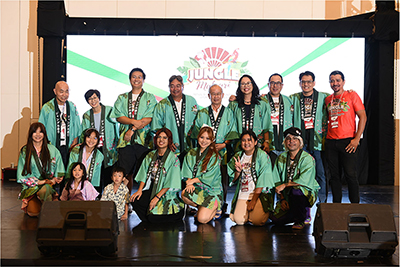 Local Nikkei people serving as organizers for the Jungle Matsuri held by the Japanese Brazilian Association of Western Amazon (August, Brazil)
Local Nikkei people serving as organizers for the Jungle Matsuri held by the Japanese Brazilian Association of Western Amazon (August, Brazil)In 2023, seven next-generation Nikkei leaders from five LAC countries visited Japan. Erika Akemi Tomioka, a third-generation Nikkei person from Manaus City in the center of Brazil's Amazon region, participated in the program. Tomioka is the cultural coordinator of a Nikkei organization and is involved in promoting Japanese culture through Japanese language, Japanese festivals, pop culture, and other areas. The third “Jungle Matsuri,” organized by the Japanese Brazilian Association of Western Amazon and for which Tomioka worked hard to prepare, attracted 35,000 attendees. The festival has become Northern Brazil's largest event that introduces Japanese culture.
Tomioka said that the presence of the Nikkei community is evident in the respect for the environment in education in the Amazon region, which is a value brought about by Nikkei people. She also noted that many young Japanese people immigrated to the Amazon region in the past, and that their determination has been firmly passed on to the current Nikkei community. Japanese language education is very popular in Manaus, and Manaus is the only city in Brazil that has state schools that offer bilingual Portuguese and Japanese education.
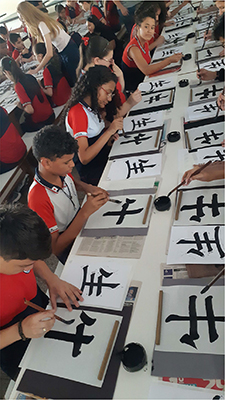 Students learning Shodo calligraphy at a bilingual school where Tomioka serves as coordinator (Brazil)
Students learning Shodo calligraphy at a bilingual school where Tomioka serves as coordinator (Brazil)Tomioka is also the coordinator of a bilingual school, but most of the students are non-Nikkei people. Japanese language and culture are favorably accepted by many people, both Nikkei and non-Nikkei, in the local community.
The Nikkei community has a large presence in various parts of the LAC region, as it does in the Amazon area. The Division for Collaboration with Communities of “Nikkei” in Latin America will continue to promote various initiatives to strengthen the bond between Japan and the Nikkei community.


